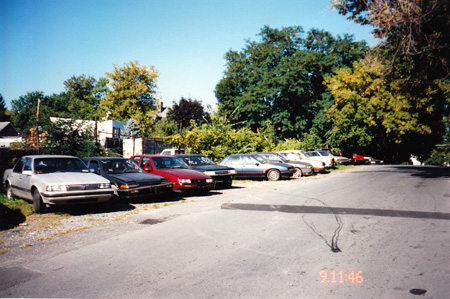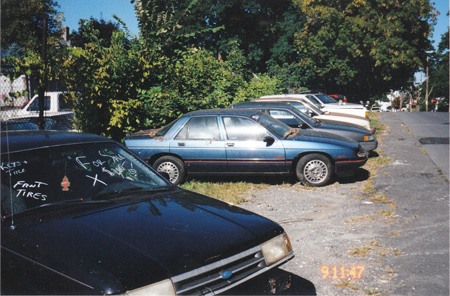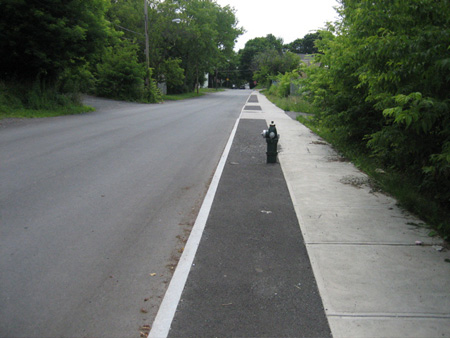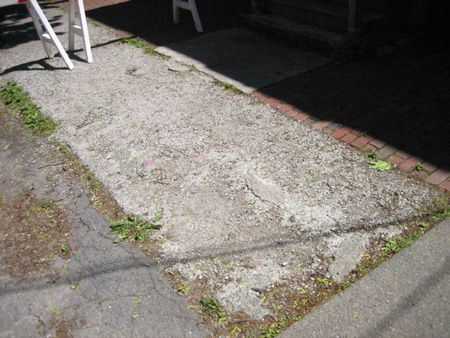June 28, 2009
Or, how to get things done in a City with a corrupt government
The other day while cleaning up in the house I found a stack of photographs of abandoned wrecked cars parked on Catherine Street. I snapped these photos around ten years ago – before digital cameras had become common. The cheap paper photos developed at a drugstore are already starting to degrade, but the evidence they display is still clear and scannable.
For about five years or so, from 1999 to 2004 as many as 30 unlicensed automobiles in various states of wreckage sat rotting along the pavement of Catherine Street between South Swan Street and Oneida Terrace. Sometimes the wrecked cars were shuffled around or replaced with other junkers, but many of them sat unmoving for years. Despite constant complaints the City pointedly refused to do a damn thing about these dangerous wrecks… with one small but significant exception.
 Catherine Street Eight Years Ago
Catherine Street Eight Years Ago
How did they get there? These wrecks were carefully dropped and abandoned on Catherine Street by one of our worst neighbors, the notorious towing company with the City contract, Joe’s Osborne Street Garage. The line of unlicensed autos ran along Joe’s barb wire fence and on down the hill. I know for a fact that this collection of vehicular junk was dropped on the pavement in the heart of my neighborhood with the open knowledge and approval of the Current Mayor of Albany, Jerry Jennings.
How do I know the Current Mayor did that to us? These old paper photos are the evidence. Jerry told Joe’s to put these junks out on Catherine Street and leave them there. And Joe Gimondo, the owner of Joe’s Garage, enthusiastically complied with Jennings’ request.
 Dominick Calsolaro
Dominick Calsolaro
On three different occasions during those five years I followed the advice of my first ward common council member, Dominick Calsolaro. I carefully photographed Joe’s Catherine Street wrecks and had four copies made of each photo. One set of photos went to The Mayor, one set to the head of the Department of General Services (DGS) and one to the corporation council, the City lawyer. And one set of photos I kept for myself, which I promptly lost under a pile of crap in my house.
Please understand that I did not engage in this civic exercise merely to keep my elected officials dutifully apprised of an ongoing illegality or because I was naive enough to think that the City would ha! ha! respond to my concerns. This was back a few years ago when Jerry Jennings still reigned unchallenged and supreme like an Iranian mullah so of course I received no official response whatsoever from anyone.
No, the point of this photographic and narrative exercise was to formally inform the City of Albany of their legal liability. Here’s how it works. Suppose a dear, sweet little old lady walking down Catherine was forced out into the street into the path of a suburban SUV. The little old lady will find out that she cannot sue the City for deliberate neglect unless she can prove that the City had prior knowledge of the problem and failed to correct the problem in a timely manner.
So then, by my telling the City about the wrecked cars on Catherine, and by my keeping a record of the correspondence, the City leaders had legally become responsible for their policy of applied negligence and could be more readily sued for their criminal neglect. The dear sweet elderly victim can drag the City’s corrupt ass into court and expect to win.
That’s the theory. Of course, the City administration can fail to respond to the complainer and pretend they never received notice of the problem. The suit and tie who was the corporation counsel at the time verbally acknowledged to me that he had received my photos, but I can’t exactly prove that in a courtroom. But I know for a fact that The Current Mayor saw the photos and read my narrative.
Jerry Jennings did respond quickly to one little problem that I had pointed out. You see, there is only one fire hydrant for this entire long block of Catherine Street. It was with my second set of photos that I demonstrated that Joe Gimondo’s wrecked vehicles were dangerously blocking this hydrant, and Joe had been doing this for years. There would have been some serious liability if there happened to be a fire nearby.
 The Only Hydrant
The Only Hydrant
I dropped off my stack of photos at City Hall, and the very next day Joe’s tow trucks were out on Catherine Street moving the wrecks away from the hydrant. For the next few years, Joe always carefully maintained an exactly five foot space on either side of the hydrant. As for the wrecked cars that had been blocking the hydrant, Joe’s employees dropped them further down Catherine Street, where they remained.
By this minor bit of activity I know that Current Mayor Jennings willfully and deliberately encouraged Joe Gimondo to maintain these wrecked vehicles on Catherine Street. Inside of a 30 second phone call His Majesty could have told Joe to pick up his garbage, and Joe would have immediately complied. But with a 30 second phone call all The Current Mayor did was tell Joe to move the junkers away from the hydrant.
Let me emphasize that. These unlicensed wrecks were not merely dumped on Catherine Street, they were maintained.
As for why, one might surmise that Jerry Jennings is a nasty, petty minded individual who wastes valuable time and money working out His personal problems on the people who live in “His” City. He pulled this nonsense not merely because He wanted to degrade my neighborhood (we always vote heavily against Him and His machine.) He also wanted to make Mr. Calsolaro look bad by turning an important street in his ward into a junk yard.
During weekly rush hours, many hundreds of suburban gas guzzlers speeding back and forth from Delmar take a short cut down this block. Every day for more than five years these wrecked vehicles announced to these outsiders, “Welcome To Jerry Jennings’ Albany.” Believe me, I took every opportunity to explain this to anyone and everyone who noticed the wrecks and wondered why they were there, and why no one did anything about them.

Oh, in case anyone was wondering, I called the police repeatedly over the years. This happened partly during the era of police denial of service, when the Albany police routinely refused to answer calls for help from Albany citizens. But during this time the police did indeed make a vigorous effort to keep the roadways in my neighborhood clear for the traveling convenience of their fellow suburbanites. So I hoped that The Police might respond to this roadway obstruction that affected them and their kind.
No such luck. I was informed on several occasions by City of Albany police officers that the The Police were partners with Joe and did not wish to cause any problems with him. I did not realize until long after these one sided conversations that these suburban boys in uniform were threatening me, telling me to back off complaining about the wrecks on the street! Yes, I can be naive sometimes.
Dominick was clearly as frustrated with this situation as I was, perhaps more so. Thus, being an innovative elected official, he came up with plan B.
Shortly after Dominick was elected to the Common Council for the first time in 2001, he put in a request for a sidewalk on this block of Catherine Street to be built where there had never been one. The sidewalk was originally supposed to be on the other side of the street, but to my surprise several residential property owners on that side did not want it. I think they just didn’t want to shovel snow off the walk in winter, but never mind.
So Dominick, who has been spectacularly successful getting sidewalks built or replaced in his ward, came up with the idea of putting the sidewalk on the other side of the street alongside the Joe’s Garage compound. “That way they can’t park their junk half on the sidewalk,” he figured, “and with proper curbstones The Police will have to ticket.”
 Sgt. Chris Mesley
Sgt. Chris Mesley
This Past April Testifying About The Ghost Ticket Scandal
We never found out if Dominick’s reasoning was correct. In 2004 fate arrived in our neighborhood in the form of Officer Chris Mesley, on the job and riding a bicycle. Yes, the same well known Albany cop (now a sergeant) who maintains a controversial and powerful role as head of the Albany police union was doing standard harassment duty in my neighborhood.
Mesley was diligently working his way down Catherine Street writing tickets for my neighbor’s parked cars, you know, looking for expired inspection stickers, missing plates or overdue parking tickets. This was business as usual, a cop used to work carefully through my neighborhood making problems about every three months or so. Every single one of these suburban boys and girls in uniform would make a special point of turning their backs on Joe’s wrecks dumped in the street while they harassed my neighbors, as if Joe’s wrecks didn’t exist for them.
You folks out there who don’t live in Albany, are you getting an idea of what life has been like with Jerry Jennings?
The Wife and I, who happened to be on the street when Mesley came by, struck up a long conversation with him while he straddled his bike. We eventually steered his attention to the wrecks immediately behind him, and we narrated for him the tale of how we tried to get the City and the police department to obey the law and clear these hazards off the pavement. Then, being the diplomatic fellow that I am, I told Mesley that we did not hold not him personally responsible for this street junkyard because no doubt he had been ordered by City Hall to maintain Joe’s wrecks out here at all costs.
Mesley turned his bike around and stared at Joe’s line of wrecks for a long time. Then he turned again to us and said, “I promise you I will personally take care of this. It’ll take a few weeks, but I’ll get them off the street and keep them off.” And indeed he kept his solemn promise. Within a month Joe’s wrecks disappeared from Catherine Street.
Apparently Mesley was so moved by our resigned appeal that his humanity popped to the surface. But I think that he had become genuinely embarrassed by the City’s policy of applied harassment to downtown neighborhoods. In any case, the harassing police sweeps through my neighborhood also ended at this time.
Mesley has been lambasted thoroughly not only in the local blogoshere for his public statements, but also in the corporate and non-corporate media. Often for good reason. However the regular reader of this blog will note that I have never criticized the police union leader. Now you all know the reason I have not.
 Dominick’s Catherine Street Sidewalk Today
Dominick’s Catherine Street Sidewalk Today
Finally in 2008 Dominick’s sidewalk got built on Joe’s side of the street. The contractor doing the work, Hudson River Contracting, wanted to make a little extra profit for themselves by sneakily laying asphalt instead of concrete. They apparently figured that in our neighborhood no one would care, or maybe someone in City Hall told them that we didn’t care.
As soon as we spotted their little crime against our street we called Dominick, who dropped everything that morning (he has a regular job, you know) to track down Bill Bruce, who at that time was the commissioner of DGS. Contrary to the misinformation that the foreman (a fellow named Commisso) fed to me, Hudson River was indeed under contract from the City to pour concrete, not asphalt.
With Dominick howling at his back, Commissioner Bruce showed up on Catherine Street within the hour and stopped the job. He subsequently made them pull up the asphalt that they had already spread and pour concrete like they were supposed to. And by the way, I’ve noticed that Hudson River has not been doing much City contract work lately.
So thanks to my Common Council member and thanks to the head of the police union, Joe and Jerry’s wrecked autos have been removed from Catherine Street and replaced with a shiny new sidewalk. That brings us to the present year and to the decaying sidewalk around the corner on my side of the street.
The block that I live on is short, three houses long, running from Catherine to Morton Avenue. The landlord who owns the brick house two houses down from me on the corner of Morton has some sort of political connection inside City Hall. I know this because he has made use of this connection in the past, and he has mentioned it to me.
Last month, without any warning, a crew of City DGS guys showed up one morning and started replacing the sidewalk along this guy’s property line. The one third of the sidewalk alongside this fellow’s property was a bit old, but this was the only part of the sidewalk on my side of the street that was entirely intact. The planned repair job did not include the middle third of the sidewalk, which looked like this:

As you can see, this was not so much a sidewalk as a patch of gravel. It had been like that for more than twenty years, since before Jennings captured City Hall for Himself.
This decayed former patch of sidewalk, so typical of the carefully neglected walkways of the South End, had become a kind of monument. For my immediate neighbors it was a symbol of Albany City government, a kind of living example of what exactly is wrong with our political leaders. Every so often one or more of my neighbors would stand and contemplate this monument. Then they would condemn our City politicians as worse than useless.
Dominick Calsolaro put in a request to replace the entire sidewalk every single year, but was ignored. But now that the City was showing some election year interest in our street, The Wife and I decided it was time to get radical. So after some phone calls, I wrote a nice polite public email (with photos) to Nick D’Antonio, the current head of DGS. The key part of my message was this:
As the foreman and the guys on the crew all said, the final result "is going to look stupid." I would also add that not repairing this extreme hazard while the crew is present and working will increase the City being held liable for an accident, since it is obvious that the City is and has been aware of the problem in front of 221 [S. Swan St.]